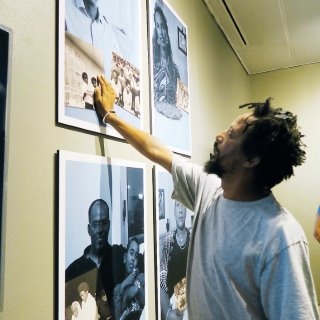click to dowload our latest edition
CLICK HERE TO SUBSCRIBE TO OUR NEWSLETTER


Published
5 years agoon
By
adminTALI FEINBERG
He was speaking at the opening of the exhibition Operation Moses – 30 Years After at the South African Jewish Museum in Cape Town.
Abebe says he was given the name “Dan” by the Jewish Agency when he landed in Israel, and many people call him that or “Danny” today. But he actually prefers his given name, Adeno, which means “healthy”.
Abebe is currently the Habonim Dror shaliach in South Africa, and he sees himself as a true Israeli. He served in the army, speaks perfect Hebrew, went to yeshiva, was a journalist at the Israeli newspaper Yedioth Aharonot, and gave his children Hebrew names. “I was even the first Ethiopian Israeli to be on Army Radio,” he says.
But his life began in a different time and place: a tiny village in Ethiopia so remote that villagers say “G-d created us and then forgot us”. These Ethiopian Jews, known as Beta Israel, were so cut off from other people and world Jewry that they did not celebrate Channukah or Purim, and did not know of the Talmud, as these all came after they were separated from the Jewish Diaspora.
But their traditions, oral history and identity demonstrated that they are Jewish in every way. “We believe we come from the lost tribe of Dan. We dreamed of Jerusalem, we had synagogues and rabbis, and we practiced Judaism very strictly,” remembers Abebe.
His childhood seems like it was from another life. He was a simple shepherd boy who never knew exactly when his birthday was, but he and his family were happy. Then, one day, his father started selling their cattle and other worldly goods, but the young boy was not told the reason.
“Then one evening – it was Rosh Hashanah night and Shabbat – we left our village and started walking. We walked 800km to Sudan, where we were put in refugee camps.”
At this point, Abebe becomes visibly emotional. “I do not say it lightly… but we suffered a small Holocaust in Sudan. A third of the people died en route. The suffering was terrible. Everyone lost someone.” This included his family: an aunt who was young and healthy passed away suddenly from disease during the journey to Sudan, but the family had to keep going. “This was very hard,” he says.
He believes this aspect of Operation Moses needs to be highlighted, as for him it was the most traumatic part. Although the exhibition explores Ethiopian Jews’ lives in Israel, he would like to see an exhibition on the suffering experienced in Sudan.
Abebe recalls being loaded onto a cargo plane but not really understanding it was a plane, then arriving in Israel and having to figure out how everything worked, from a fridge to a bus. The family settled in Jerusalem – the place of their prayers and dreams – but the confusion of life in Israel soon hit them hard.
This bewilderment was overpowering for many Ethiopian Jews, including his father. “Thirty years later, he does not know how to speak Hebrew, and he doesn’t work. He tried, but it was too difficult. Now he dreams of Ethiopia,” says Abebe, noting that this is normal among older men in the Ethiopian community.
This contrasts to the idealised narrative of Ethiopian Jews settling easily in Israel. “Many men really struggled. They did an ulpan to learn Hebrew, but beyond that they just had to find their way,” he explains.
Abebe says his father has hardly ever spoken about his experiences in the refugee camp in Sudan, and perhaps it is this trauma that affected his ability to integrate into Israeli society. Despite these challenges, he says his father is his hero.
In contrast, many women succeeded – simply because they had to for their children. Abebe’s eyes light up as he describes his mother, who got her driver’s licence, learned Hebrew, and ensured her children became integrated Israelis.
Many of these contrasts are reflected in the exhibition, which tells the stories of 10 Ethiopian Jews 30 years after the operation. Some have succeeded and risen to the upper echelons of Israeli society, whereas others have battled poverty, unemployment and discrimination. Some yearn for Ethiopia; some see themselves as only Israeli.
Abebe knows everyone featured in the exhibition. Although they are not close family or friends, it is a tiny community and many suffered together in Sudan. One or two were even children with him in the refugee camp.
He has returned to the village where he was born, taking his children to visit, and he says they could not believe how remote it was. It is in moments like these that Abebe feels like a “bridge” between his parents, who fought so hard to become Israeli, and his children, who take their Israeliness for granted.
“For me, it was like jumping 100 years from Ethiopia to Israel,” is how Abebe describes the cultural challenges and battle to integrate. “But for my parents, it was like 300 or 400 years. Maybe it was just too hard.”
Another Israeli at the exhibition, Lior Shur says hearing Abebe speak was the first time he realised how tough it was for Ethiopian Jews when they arrived in Israel. “I just realised how unprepared Israel was, both literally and physically,” he says. “And we are still feeling the effects today.”
